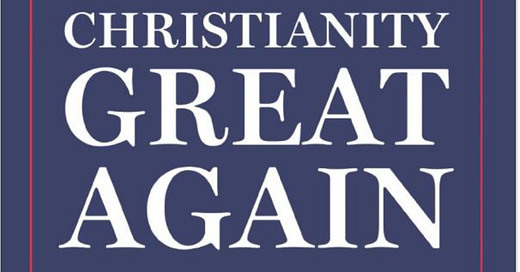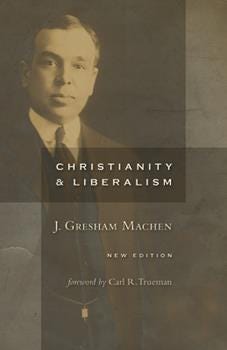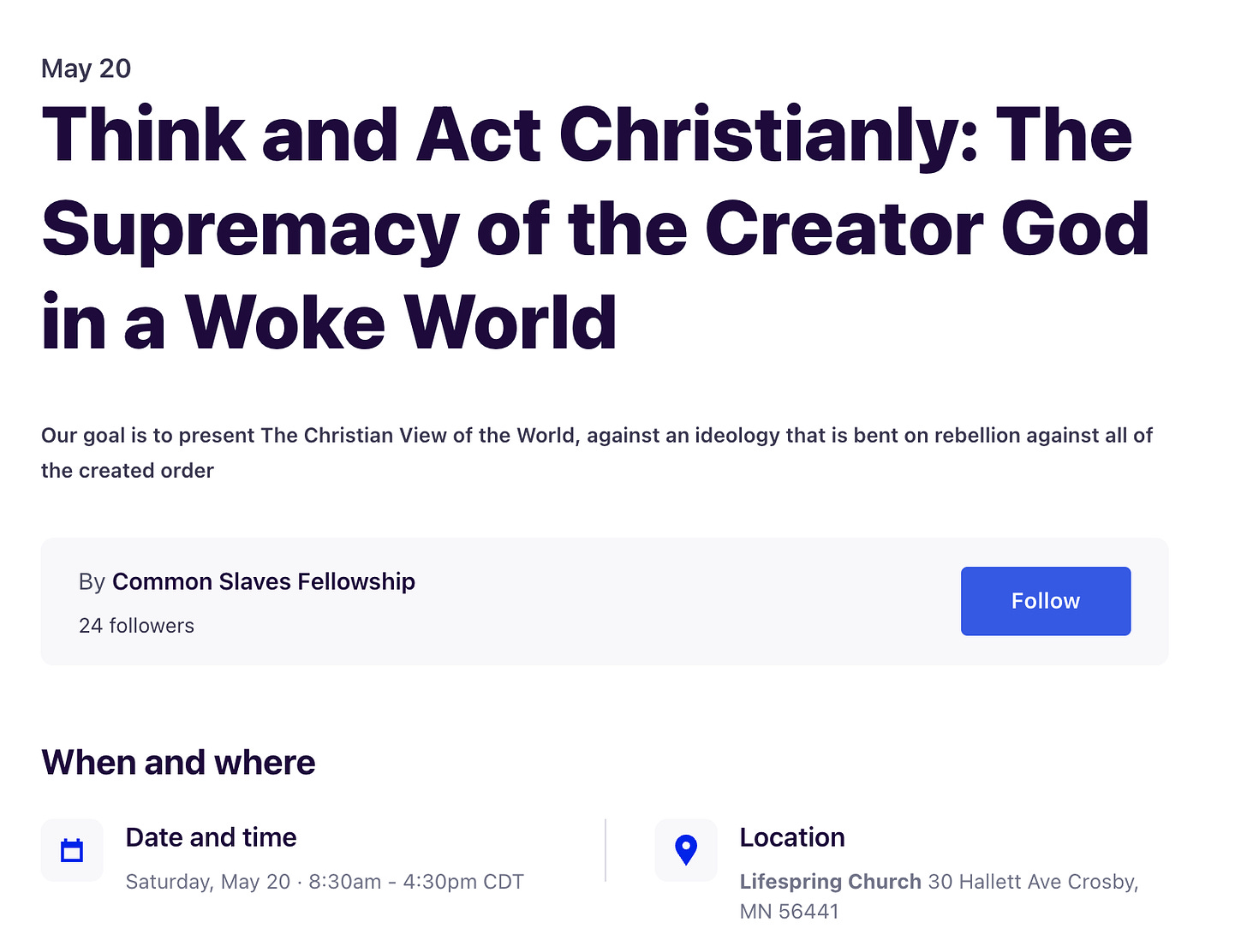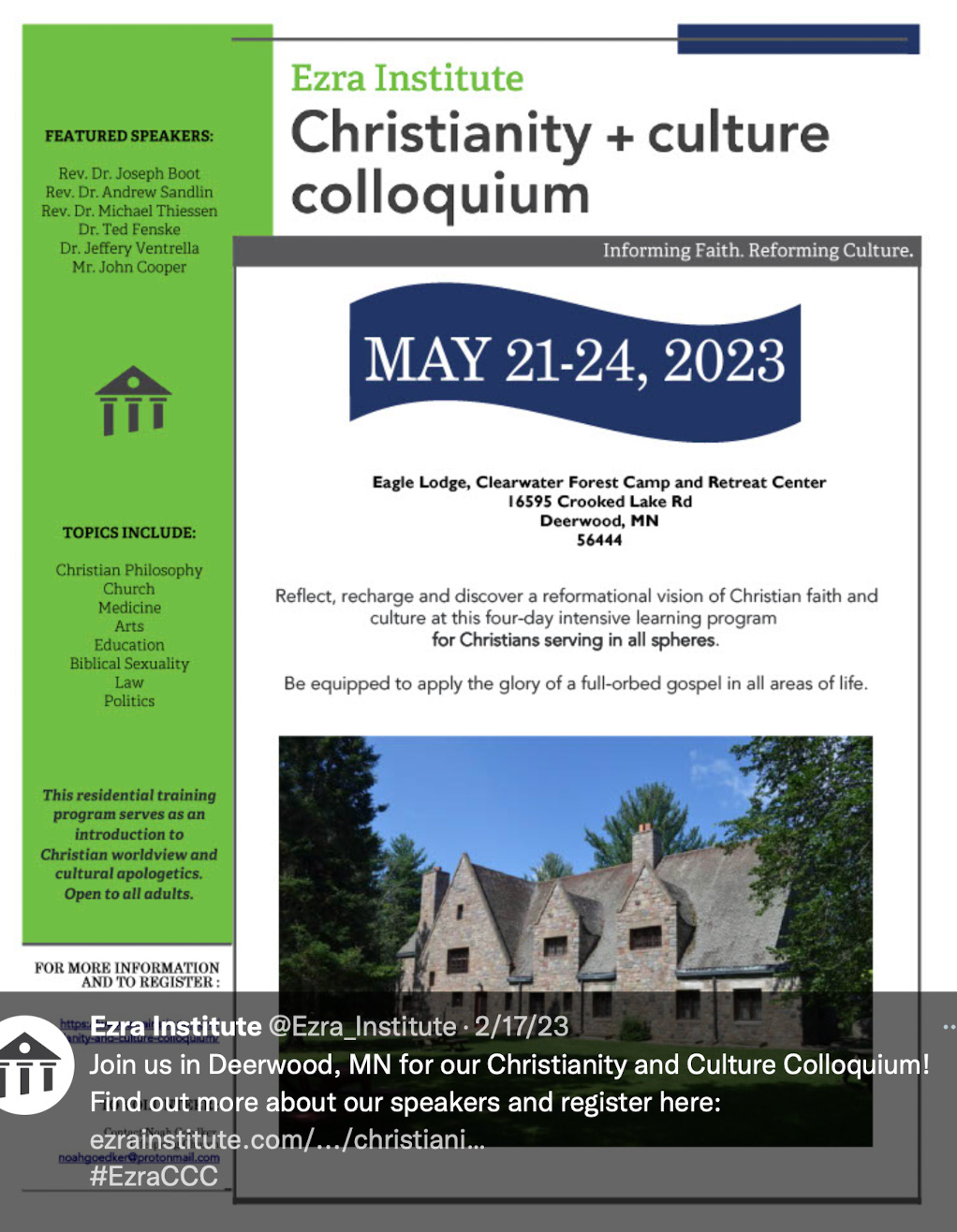𝐶ℎ𝑟𝑖𝑠𝑡𝑖𝑎𝑛𝑖𝑡𝑦 𝑎𝑛𝑑 𝐿𝑖𝑏𝑒𝑟𝑎𝑙𝑖𝑠𝑚 Turns 100
A century has not relaxed the battle-lines of a robust, orthodox, confrontational biblical Faith on the one hand and all accommodationist revisions on the other, whether in church or culture.
Dear friends and supporters:
J. Gresham Machen (pronounced MAY-chen) published Christianity and Liberalism (C&L) in 1923. It’s one of the most important theological books of the 20th century (it’s more aptly a book of theological apologetics). If you’re a consciously orthodox Christian, and distinguish yourself from theological liberalism, you’ve almost certainly been influenced by this book, directly or indirectly, whether you’ve heard of the book or not.
Machen was a Princeton Seminary-trained New Testament scholar who went on to do advanced work in Germany, a hotbed of liberalism from the 19th through the early 20th centuries, and who returned to teach at his alma mater. Machen held fast the bodly orthodox theology of his Princeton Professor Benjamin B. Warfield, one of the most towering Christian intellectuals in U.S. history.
Machen taught at Princeton at a time it was drifting into liberalism itself, and his book was (and is) a trumpet call to preserve the biblical Faith in the midst of a flood of liberal revisionism.
For his troubles, Machen was expelled from his Presbyterian denomination on the grounds of his supporting an independent missions agency. The real reason is that he was such a vocal opponent of the liberal religion. After Princeton Seminary was reorganized by its board along liberal lines, he departed to help found Westminster Theological Seminary, and, subsequently, a new denomination today called the Orthodox Presbyterian Church. Machen was, or became, a separatist: he did not set out to be a separatist but came to believe it was impossible to be faithful to Jesus Christ and remain in a church or denomination that opposed the biblical Faith.
C&L makes a bold case: liberalism isn’t a variation, or even a severe deformation, of Christianity. Rather, it’s another religion altogether:
The plain fact is that liberalism, whether it be true or false, is no mere “heresy” — no mere divergence at isolated points from Christian teaching. On the contrary it proceeds from a totally different root, and it constitutes, in essentials, a unitary system of its own. (172)
This declaration might seem axiomatic to us today, but it was not 100 years ago, and if it seems self-evident today, it’s probably because we’ve been influenced by Machen.
Liberalism (sometimes equated with modernism, though the two are not precisely identical) is the notion that the Christian Faith must adjust itself to the contemporary temper. It must become a “religion of and for the times.” The Old Testament prophets and Jesus and the apostles in the New Testament were children of their own times, subject to all of the ignorance and limitations of the ancient world: premodern cosmology, supernaturalism, myth, and so forth. Had they lived today, they wouldn’t advocate the form of Christianity they did. To be faithful to Christianity, therefore, we must make it faithful to our times. True Christianity is contemporary Christianity.
Machen contested this basic premise. He argued that, right or wrong, Jesus Christ and the earliest apostles, and particularly the apostle Paul, had a right to legislate the perennial definition of Christianity. You’re free to create a religion at stark variance with theirs; just don’t call that religion Christianity.
Christianity’s greatness has diminished, that is, Christianity historically and culturally considered in the West. By contrast, the greatness of the Christian Faith objectively understood has not lessened: the Lord Jesus Christ and his word and the Cross and resurrection, for example, are just as great today as they ever were. But the Faith at is practiced in the West and particularly as it influences what we nowadays call “public” life is at a low ebb. This diminution has occurred before historically both in the West as well as in the rest of the world, and it has been recovered. A contribution toward that recovery in our own time is the chief objective of the small book.
Get the book here.
The Great Liberal Revisionism
Machen’s burden is to demonstrate that on such critical theological issues as doctrine, God, man, Christ, the Bible, and the church, Christianity and liberalism offer diametrically opposed, competing religious claims. Examples:
Doctrine
Liberals claim that Christianity is “a life, not a doctrine.” But the fact is, Christianity is full of doctrines, more than any other major religion, and in any case, every way of life is dictated by a particular doctrine or doctrines. There is no Christian life without Christian doctrine, or, for that matter, liberal life without liberal doctrine.
God and Man
For liberals, God is the universal Father. He is the Father of all humans, and therefore we’re all his children. They therefore offer no distinction between God’s Fatherhood in a providential sense and in a redemptive sense. Liberals disastrously confuse the two. In the Bible, only those who have trusted Christ for salvation are the children of God in the redemptive sense and can be his children enjoying eternal life. All who don’t trust Christ are children of the devil (Jn. 8:44).
Christ
Liberals assert that the central role of Christ in Christianity is to provide a moral example for us to follow. Machen shows that while Christ’s example is vital, the chief role that Jesus plays in Christianity is as the world’s Redeemer. He died on the cross and rose again so that a sinful humanity can be saved from sin and its consequent judgment. It is useless to talk of Jesus as an example if we’re still in our sins.
Bible
Liberals posit the Bible as a humanly written testimony to religious experience. In stark contrast, Christians recognize the Bible for what claims to be: God’s inspired and infallible word. The Bible doesn’t offer warm platitudes designed to create a generic, universal morality. It offers the message of what God has accomplished in Christ and how the redeemed are to live according to his word, and how the unredeemed are judged according to the same word.
Church
To liberals the church is a community of all who profess identity with Jesus Christ (as they define him). To Machen, the church is the community of the redeemed and their children, who profess the biblical faith hammered out in the great historic Christian creeds. Machen understood Christian doctrine is a criterion of the Christian church. If a community claiming to be a church denies cardinal Christian doctrine, it ceases to be a church, and all genuine believers should separate from it:
[I]t is highly undesirable that liberalism and Christianity should continue to be propagated within the bounds of the same organization. A separation between the two parties in the Church is the crying need of the hour. (160)
At the time Machen wrote, liberalism was infecting almost every major U.S. denomination, including his own, the Presbyterian Church in the United States. In many orthodox quarters, a lax and accommodating attitude toward liberalism prevailed. Many orthodox recognized liberals as brothers, though, of course, disagreeing with the latter’s theological premises. It was left to Machen to demonstrate that this laxity and accommodation, if unchecked, was both theologically and ecclesiastically catastrophic. These two religions, Christianity and liberalism, were fundamentally irreconcilable, mutually exclusive. Today, the orthodox are much less naïve about liberalism, precisely due to the impact of Machen’s work.
The Relevance of C&L
But this doesn’t mean Machen’s book has lost its relevance. All to the contrary: it’s possible his book, though dated in some respects, is more pertinent today than it was 100 years ago. Why?
Perennial Modernism
First, Christianity suffers from the perennial temptation to adjust the church to the pervasive world spirit (see “The Accommodation Junkies”). The guiding impulse of liberalism infects conservative churches even more than it did 100 years ago. In fact, this premise, that Christianity must adjust to the spirit of the age is as old as the apostolic era, and in fact, was even pre-dated by the ancient Jewish church, consistently tempted to accommodate to the pagan nations surrounding it. R. J. Rushdoony was correct, then, with his cleverly titled article, “Ancient Modernisms.”
The spirit of 19th century American liberalism abounds in a new iteration (yesterday’s contemporary gets obsolete real fast). Let’s call it Liberalism 3.0. Many conservative pulpits, for instance, rarely address sin (other than racism, sexism, and “climate denial”). Instead, sermons are essentially a form of self-help therapy: Jesus wants what’s best for you and will help you meet your life’s goals. Climb aboard the Jesus train.
Sexual egalitarianism, moreover, has become the rule in many conservative churches, manifested in women pastors and church leaders, in clear violation of Paul’s un-nuanced creational teaching. Although those conservatives interpret the Bible to permit such ecclesiological egalitarianism, please consider the rule that Christianity should be highly suspicious of any new biblical interpretation that “just happens” to coincide with the spirit of the age.
Preserving and Contending
Second, it’s insufficient to proclaim the Faith — we must also defend it. One reason virtually every major U. S. denomination surrendered to liberalism is the large number of non-confrontational orthodox, who recognized the error of theological liberalism but didn’t believe it their duty to expose and oppose it. Indeed, as George Marsden has shown (180–184), had these denominations opposed and exposed — and expelled — liberals and liberalism, they could’ve saved their church, because the non-confrontational orthodox (whom Marsden calls “institutionalists”) were, along with the confrontational orthodox, in the numerical majority. The liberals were in the numerical minority, but the quiescence of the non-confrontational orthodox allowed the liberals finally to win the day.
If we refuse to earnestly contend for the Faith, as Jude 3 demands (not, by the way, for mere denominational distinctives), we cannot preserve the Faith. “You cannot preserve a position without crusading for it” (John E. Ashbrook).
Drifting into Anti-Christianity
Third, as today’s accommodationists in conservative churches and denominations gradually abandon biblical truth, including sexual truth, they will equally abandon Christianity. The pressing issues today surround the Sexual Revolution, and not the Trinity, the virgin birth, and the inspiration of the Bible as in the early battles with liberalism. Many conservative Christians verbally confess the Apostles Creed every Sunday while concurrently supporting same-sex “marriage,” the validity of “same-sex attraction,” and transgender “Christians”; but to deny biblical ethics is no less pernicious than to deny creedal doctrine. Sexual apostasy in the church leads to anti-Christianity no less than early creedal apostasy did. That is to say, churches that (for example) normalize same-sex “marriage” are no longer Christian churches (see “Homosexuality as Heresy”).
Conclusion
When Machen wrote C&L in the early 1920s, the great battle was between liberalism (modernism) and evangelicalism (fundamentalism) with the non-confrontational orthodox (institutionalists) handing the institutional victories to the liberals by default.
Today the battle has morphed slightly into the “progressives” (cultural and ecclesial) versus the orthodox (cultural and ecclesial). It’s not simply a battle within the church but rather a battle over the culture that includes and invades the church. All the confrontational orthodox — who do not believe it suffices to affirm orthodoxy while the culture burns down from hedonistic, cosmos-overturning apostasy but know they must battle for the Faith both in culture and church — stand shoulder to shoulder in this battle, despite denominational differences. Machen, a staunch Calvinist, was happy to invite Arminians to join him in this battle, and he noted commonality even with Roman Catholics, whose faith he rightly deemed severely deformed:
Far more serious still [than with Arminianism] is the division between the Church of Rome and evangelical Protestantism in all its forms. Yet how great is the common heritage which unites the Roman Catholic Church, with its maintenance of the authority of Holy Scripture, and with the acceptance of the great early creeds, to devout Protestants today! We would not indeed obscure the difference which divides us from Rome. The gulf is indeed profound. But profound as it is, it seems almost trifling compared to the abyss which stands between us and many [liberal] ministers of our own [Presbyterian] Church. The Church of Rome may represent a perversion of the Christian religion; but naturalistic liberalism is not Christianity at all. (52)
Machen was a separatist, but he was not a sectarian. His was a catholicity of the battlefront, and he knew that all those who stand confrontationally for biblical authority and ancient catholic orthodoxy — and, today, for Christian sexual truth — are co-belligerents (Francis A. Schaeffer’s term) in the great battle of our time.
A century has not relaxed the battle-lines of a robust, orthodox, confrontational biblical Faith on the one hand and all accommodationist revisions on the other, whether in church or culture.
The lesson of Machen is the lesson for Christianity in every era: You cannot preserve a position without crusading for it.
Will you consider a tax-deductible donation to CCL via PayPal or Venmo? Or mail a check to CCL, Box 100, Coulterville, CA 95311. God uses you to keep us going — and expanding.
Personal
I’ll be speaking at three events next weekend in Minnesota. First is the spring Common Slaves conference (Pastor Eric Anderson), Saturday, May 20 at Lifespring Church.
On Sunday, May 21 I’ll be preaching in morning worship at Lifespring. Then I’ll be addressing the following Ezra Institute event (Dr. Joseph Boot):
I’m eager to see many of you there.
Yours for confrontational orthodoxy,
Founder & President, Center for Cultural Leadership
Tweet of the Week
Coming Soon From CCL:
More great stuff:
The Center for Cultural Leadership site is here.
My Amazon author page (print and digital) is here.
My I-Tunes sermons, lectures and podcasts are here.
You can find my sermons and lectures at my YouTube channel.
Sign up to get my blog updates here.
Here’s my Twitter feed.
If you want to get the free exclusive hard copy publication Christian Culture, please send me a Facebook private message.
The CCL phone number is 831-420-7230.
The mailing address is:
Center for Cultural Leadership
P. O. Box 100
Coulterville, CA 95311










